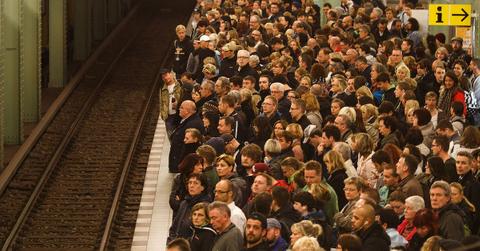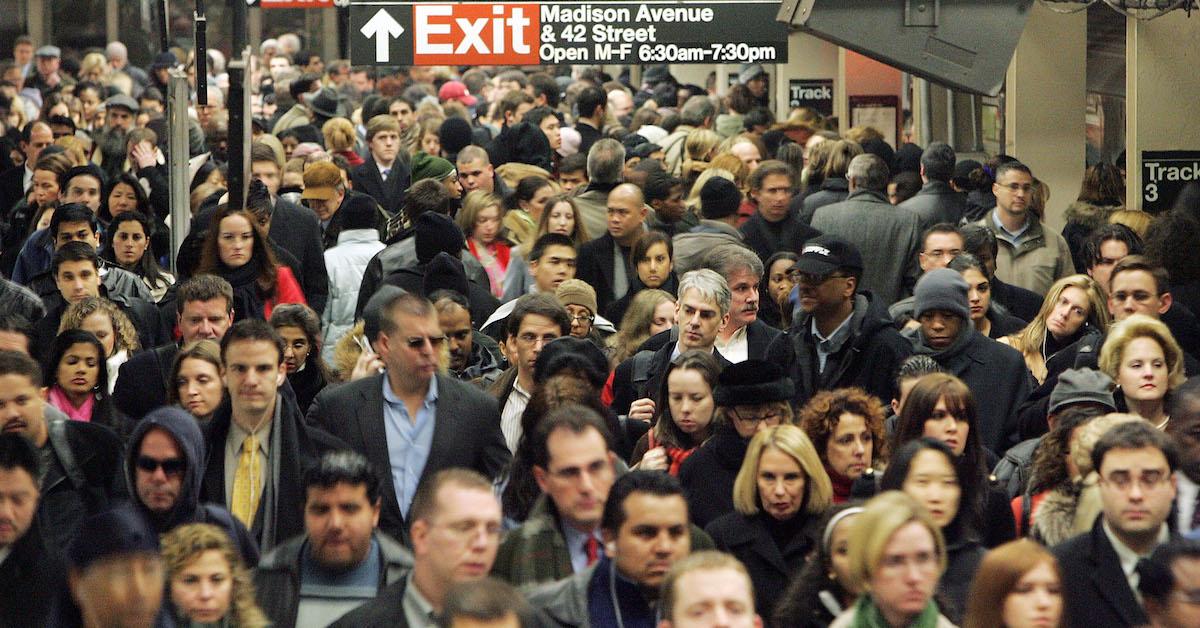Does Overpopulation Hurt the Planet? Or Should We Solely Blame Governments and Industries?
Updated Dec. 7 2022, 2:22 p.m. ET

Passengers crowd the platform as they wait for the subway train during a four-day strike by the GDL train drivers labor union on Nov. 6, 2014 in Berlin, Germany.
In November of 2022, planet Earth reached a new milestone: A human population of 8 billion. In case you didn’t realize, that’s a lot of people — and it’s a figure that are leaving many concerned about the overpopulation crisis and its ramifications. But how does overpopulation affect the environment?
Here’s a look into overpopulation, how it’s impacting the planet, some potential solutions — plus an argument as to why individuals should not be blamed for overpopulation or the climate crisis.

Commuters pass through Grand Central Terminal during morning rush hour in New York City.
What is overpopulation?
According to the Population Reference Bureau, George Morris, author of Overpopulation: everyone's baby, defines overpopulation as “when there are more people than can live on the Earth in comfort, happiness, and health and still leave the world a fit place for future generations.”
Basically, when the Earth cannot sustain the amount of humans on it, that means our population is too high — aka overpopulation.
Obviously, this definition is not an exact science, as everyone will have different standards for what entails a healthy planet that can support all its residents. Additionally, we can’t only look at overpopulation as something that is only a state of being for the entire planet — countries, states, and cities can also be overpopulated, depending on their population, and how many people their area can support.
How does overpopulation affect the environment?
The human population has grown aggressively over the past century; in 1974, there were 4 billion people on Earth; just 48 years later, that number has doubled, with 8 billion people currently inhabiting the planet. And as the population has grown, so have the effects of climate change — leading us to the ways that overpopulation impacts the environment.
Every human on Earth is responsible for a significant amount of resources over the course of their lifetime, from water to food to land to fossil fuels. In fact, “average person” in the U.S. uses nearly five times more resources than the planet’s sustainable yield, according to the Population Media Center.
So, the more humans on this planet, the more resources that get depleted. And with many of these resources being unrenewable (or, relying on unrenewable or environmentally-destructive industries), it’s evident that the higher the population, the higher humanity’s environmental impacts.
Plus, the extraction of resources produces emissions and pollution, which subsequently harm human health, as noted by University of California, Berkeley’s Understanding Global Change.
According to the U.S. Department of State, human populations are growing the quickest in sub-Saharan Africa and South Asia, which aggravates poverty, and negatively impacts environmental sustainability in regards to water and food access. (That said, some argue that placing any blame for the climate crisis on these regions — especially on regions that are in poverty or have predominantly non-white populations — is wrong and unjust; more on that in a moment.)
And as noted by the Population Media Center, overpopulation causes deforestation, less biodiversity, and an increase in emissions and pollution (which directly contribute to global warming). Additionally, as humans ramp up their destruction of wildlife habitats, they are exposed to wild animals more often, which greatly increases the chance of more diseases, epidemics, and pandemics.
Plus, the more the population grows, the greater the chance that sparring nations will start military conflicts over resources, such as energy resources and land.
Solutions to overpopulation:
There are a number of things we can do to counteract human overpopulation, as noted by Stanford University's The Overpopulation Project.
As individuals, we can: reduce our personal environmental footprints (by going vegan, living a zero waste lifestyle, living in smaller homes, or flying less); support family planning organizations; have less biological children or adopt children; educate your children on safe sex and contraception; and vote for lawmakers who support families and the environment. You may also consider taking action to make a difference on a larger scale, by getting involved with environmental groups or family planning groups.
However, the climate crisis and growing populations do not rest on the actions of individuals.
Most importantly, those in power have the greatest responsibility to take action to slow the population from growing and fight the climate crisis.
For instance, lawmakers should be helping fight overpopulation by: making contraception free and accessible to all; legalizing abortion; improving health care, such as making voluntary sterilization free; providing all students with comprehensive sex education; and more. And similarly, corporate and industry leaders should be transitioning their businesses away from fossil fuels and other environmentally-destructive activities.
Some believe overpopulation is not a key part of the climate crisis, and that it wrongly shifts the blame.
All that being said, it’s important to keep most of the pressure to mitigate the climate crisis on government and industry leaders who are most responsible for emissions. As explained by Greenpeace, some environmentalists see the “overpopulation narrative” as outdated and something that “serves to redirect the blame for societal problems to those with the least power to address them.”
Additionally, Greenpeace notes that the overpopulation narrative is actually rooted in racism, as the original arguments to reduce the world’s population for the sake of protecting the environment were targeted at primarily non-white nations.
The organization argues that the best way to deal with climate change is by “pressuring the companies who are the root cause, and through sustainable, renewable, just and equitable distribution — not by reducing the number of people on Earth.”